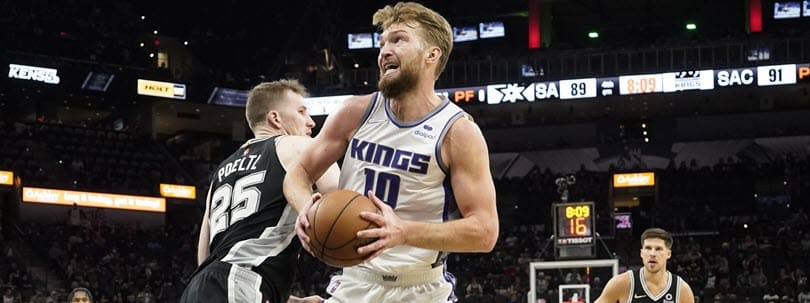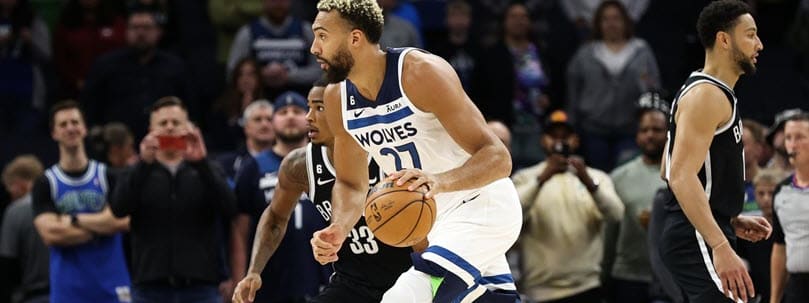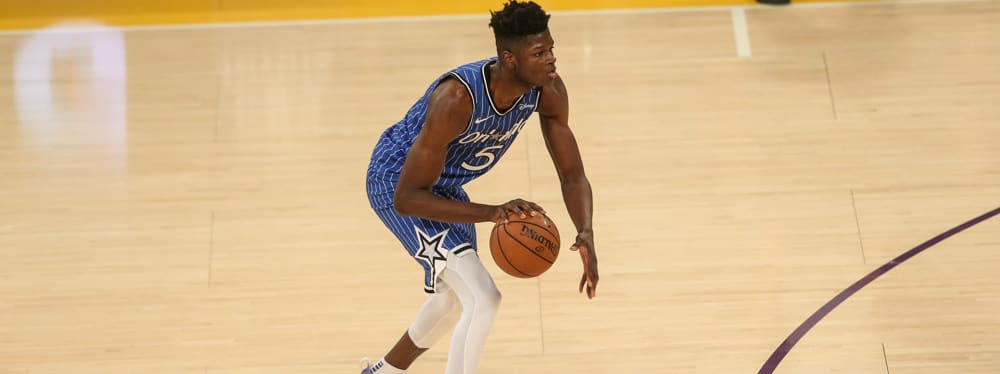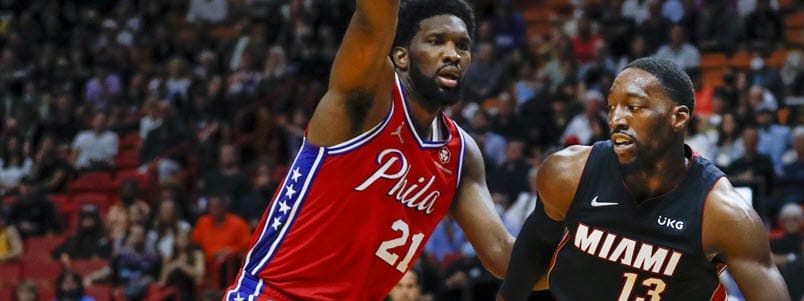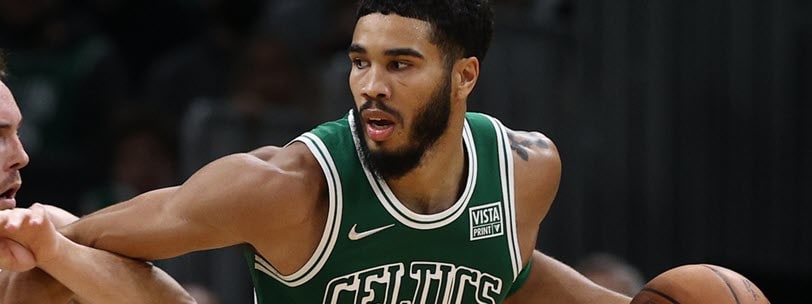Recent RotoWire Articles Featuring Serge Ibaka
See More
Ibaka signed a one-year deal to remain in Milwaukee, and based on what we saw to end the 2021-22 season, he may struggle to be an every-night part of the rotation. Across the entire campaign, playing for both the Bucks and the Clippers, Ibaka saw his overall rank fall to 306, a far cry from where he was only two seasons prior. His days of being a fantasy-relevant option appear to be well behind him, although he is a name to watch should one or both of Bobby Portis and Brook Lopez suffer an injury.
Ibaka was having a nice run as the Clippers' starting center before a serious back injury derailed his season, and he ended up playing just 41 games. He saw 23.3 minutes per game, essentially splitting time with Ivica Zubac, and averaged 11.1 points, 6.7 rebounds, 1.8 assists and 1.1 blocks. While it was the second-worst fantasy season of Ibaka's career on a per-game basis (ranked 133rd), his presence as a floor spacer helped create driving lanes for the Clippers' primary scorers, Paul George and Kawhi Leonard. The 32-year-old should be ready for the start of training camp, and it's fair to expect him again to split time with Ivica Zubac. With Leonard (knee) out for much, if not all, of the 2021-22 season, it's possible some more usage is funneled to Ibaka, or that he plays more power forward. He's hovered around ranks 70-90 in recent years when given 25-plus minutes, so that should be viewed as his upside. That said, there's probably little reason to draft him there, as he's not exactly bursting with upside at his advanced age. Ibaka is best suited as a late-round target for managers in deep leagues who need big man depth.
The veteran big man showed few signs of slowing down in his 11th NBA season, producing numbers that looked quite similar to those he recorded in the Raptors' championship campaign the year prior. While Ibaka started in slightly less than half of his 55 games, his minutes dipped negligibly from 27.2 per game in 2018-19 to 27.0 last season. He increased his points per game from 15.0 to 15.4, setting a new career high. After shooting a disappointing 29.0 percent from behind the arc the previous year, he bounced back with a 38.5 percent three-point mark while upping his attempts per game from 2.3 to 3.3. The primary negative was his 0.8 average blocks, which were well below his previous career low of 1.3. While the decline of that rare commodity hurts fantasy players, Ibaka could bounce back given that he's far from over the hill at age 31. Regardless, he'll remain a useful fantasy commodity at the thin center position and should continue seeing minutes in the upper-20s with the Clippers.
After being a fixture in the Raptors' starting lineup for the first half of the 2018-19 regular season, Ibaka was forced to take on a role off the bench in the second half after the team acquired All-Star center Marc Gasol at the trade deadline. As a result, Ibaka started seeing six fewer minutes per game and his points per game average dropped from 16.0 to 12.3. He did, however, maintain strong rebounding numbers. In fact, increased his average from 8.0 per game to 8.5. While Ibaka still boasts a solid mid-range game, he shot under 30 percent from behind the arc for the first time in his career, which was likely a big factor in the team going after Gasol. But with Kawhi Leonard leaving over the summer, there may be more opportunities for Ibaka. Leonard's absence shorts the Raptors 34.0 minutes at forward, as well as 26.6 points and 7.3 rebounds per game. The loss of Danny Green also opens up extra wing minutes, and it's possible coach Nick Nurse ends up sliding Pascal Siakam to small forward, allowing Ibaka to reclaim a starting role in the frontcourt next to Gasol. That's a best-case, but realistic, scenario. When both Green and Leonard were off the court last season, Ibaka collected an additional 7.9 fantasy points per 36 minutes, which is a meaningful increase. If he can pair that with a starting role, a better fantasy season might be in the cards.
The 2017-18 campaign was Ibaka's first full season in Toronto, but it was more of the same for the 28-year-old big man. He operated as the Raptors' third option offensively behind Kyle Lowry and DeMar DeRozan, putting up 10.3 field goal attempts and averaging 12.6 points per game. That was down from 12.4 and 14.8, respectively, which was in large part due to a slight reduction in his playing time. Ibaka was on the court just 27.6 minutes, representing an effort by coach Dwane Casey to keep his starters fresh, as he also did the same with Lowry and DeRozan. Despite the decrease in his workload, Ibaka was his typical self as a rim protector with 1.3 blocks per game, while he continued to space the floor with a 36 percent clip from behind the arc. Coach Casey was fired this offseason, but assistant coach Nick Nurse was promoted to take over his spot and there's a chance he opts for a similar approach in regards to starter's minutes considering the Raptors did finish with the best record in the Eastern Conference with the strategy. That said, the organization opted to make a big move this offseason, dealing DeRozan and Jakob Poeltl to the Spurs in exchange for superstar Kawhi Leonard and sharpshooter Danny Green. Leonard is one of the best two-way players in the game and should take over DeRozan's spot as the lead dog offensively without much issue. Leonard is actually quite a bit more efficient than DeRozan and has better play-making skills and more shooting range, which should draw defenses towards him and allow guys like Lowry and Ibaka to get more open looks. While there's been some rumblings that Ibaka could come off the bench behind OG Anunoby, that still shouldn't have much of an impact on his workload, especially considering Poeltl's departure means even more minutes for Ibaka at center. With all that said, Ibaka appears set for a similar role overall despite the significant roster changes, so consider his final numbers from the 2017-18 season as a good baseline for his projected value during the upcoming campaign.
After struggling to fit in with a rebuilding Magic organization, Ibaka was dealt to the Raptors at the trade deadline this past season and finally brought some stability to a power forward position that has lacked production over the last few years. Ibaka ended up taking part in 23 games with the Raptors following the trade, averaging 14.2 points, 6.8 rebounds, 1.4 blocks and 1.8 three-pointers across 31.0 minutes. He continued to demonstrate his ability to stretch the floor, shooting just under 40 percent from the three-point line, which provided more space for guys like Kyle Lowry and DeMar DeRozan to work with offensively. Ibaka's transition to Toronto was relatively flawless and his strong play netted him a three-year, $65 million pay day. Looking ahead to the upcoming season, Ibaka should be locked into a starter's role, seeing time at both the power forward and center positions. Look for him to once again act as a floor-stretching big that provides a shot-blocking presence on the defensive side of the ball, which should translate to a similar workload. The Raptors bring back nearly the exact same roster from a season ago, which further suggests Ibaka's production shouldn't see any drastic changes during his first full year with the Raptors.
The Magic made one of the splashiest moves during the 2016 NBA Draft, and it didn’t pertain to any player they selected. Instead, it was their acquisition of Ibaka that drew attention, with the team surrendering the Victor Oladipo, Ersan Ilyasova and No. 11 overall pick Domantas Sabonis to the Thunder in order to acquire him. With Ibaka set to become a free agent next summer, he’ll now receive the opportunity to showcase himself to potential suitors in a featured offensive role for the first time in his career, after ranking a distant third in the pecking order for touches behind Kevin Durant and Russell Westbrook throughout his career. It’s a welcome development for Ibaka, who saw his per-game averages in points (12.6), rebounds (6.8) and blocks (1.9) decline last season to their lowest levels since 2016-17. While he’s less certain to see a dramatic upgrade in the latter two categories with the move to Orlando, Ibaka should have ample opportunity to enhance his scoring without any teammate on the level of Durant and Westbrook around to dominate the possessions. The 6-foot-10 Ibaka will also give the Magic frontcourt a lift on the defensive end, with he, Bismack Biyombo and Aaron Gordon providing a fearsome trio for opponents to battle with at the rim. After two years in a row of declining fantasy value, it looks as though Ibaka is finally moving back up cheat sheets.
Ibaka averaged 14.3 points, 7.8 rebounds, 2.4 blocks, 0.9 assists, and 0.5 steals in 33 minutes per game through 64 games played last season. He missed the last month of the season after undergoing minor knee surgery to alleviate soreness. Ibaka has been hitting the occasional three-point shot for the last three seasons, but with Kevin Durant out for most of the season with a broken right foot, Ibaka fully committed to shooting three-pointers as an integral part of his game last season, canning a career-high 1.2 three-pointers on 3.2 attempts per game (38 percent). At 25 years old, it appears Ibaka has settled into producing stats that are great for fantasy. It's not often that a player can block shots and hit three-pointers, but Ibaka does it and does at a high level. As he continued to extend his range over the last several seasons, Ibaka's field goal percentage dropped from a peak of 57 percent two seasons ago to a valley of 48 percent last season. New coach Billy Donovan might utilize Ibaka in different ways, but it's hard to imagine the shot-blocking marksman would be asked to change his game much. Even though Durant is returning to the fold this season and will dominate the ball of offense in tandem with Russell Westbrook, that should only help Ibaka get more-open shots and potentially improve his field goal percentage. In addition to his good 48-percent shooting from the field last season, Ibaka also recorded a career-high 84 percent shooting at the free-throw line, though it was only on an anemic 1.7 free-throw attempts per game, limiting his impact there.
Ibaka, entering his sixth year in the league, set career highs in minutes (33 per game), points (15.1), and rebounds (8.8) last season. He also averaged 2.7 blocks per contest while shooting 54 percent from the floor and 78 percent from the line, which was another career best. The calf injury that hampered Ibaka in the 2013-14 playoffs has proven to be tough to recover from completely, so owners will want to monitor his health as we approach training camp. If he's at 100 percent, Ibaka will provide the fantasy goods as usual, as the 24-year-old's offensive game continues to improve each season, and his rebounding and shot-blocking ability are up there with the best in the NBA. As an ever-growing part of the Thunder's offense, Ibaka hoisted a career-high 12.1 field-goal attempts per game in 2013-14, up from 9.7 in 2012-13. He's also a terrific rim protector on the defensive end of the floor. The power forward is locked into a significant role with Oklahoma City, meaning his playing time should only increase if anything.
Ibaka had a spectacular season in his 2012-13 breakout campaign. The young forward averaged 13.2 points (57 percent from the field), 7.7 rebounds and 3.0 blocks while playing in 80 games in the 2012-13 season. While his blocks average fell from his previous season in which he blocked 3.7 shots per game, Ibaka's improvement in scoring, rebounding and percentages more than made up for it. Ibaka's lack of rebounds for the traditional power forward spot may be the only thing stopping him from becoming an elite fantasy contributor. His whopping 57 percent field goal percentage, topped with a 75 percent free throw rate (solid for a big man), in addition to solid scoring and a high block rate make him an invaluable asset in all formats. His minutes have slowly but steadily increased over the duration of his four-year career thus far, and seeing 30-plus minutes per game this coming season would not be a stretch for Ibaka, who is likely to continue to develop this season. He will head into the 2013-14 season at 24 years of age, with the brighter years of his career still ahead of him.
Ibaka’s game continued to develop in 2011-12 when the third-year forward averaged 9.1 points, 7.5 rebounds and a league-best 3.7 blocks per game. For the third straight season, Ibaka shot over 50 percent from the field, though his free-throw percentage took a hit back to 66 percent. He’s developed a pretty good jump shot, but is best when getting out in transition. The Thunder appreciated his work enough to sign him to a four-year contract extension this offseason. It says something that the franchise locked him up long-term, leaving little salary room to keep James Harden, who could command big dollars next summer when he becomes a restricted free agent. If they can’t keep Harden, or they eventually amnesty Kendrick Perkins (next season), a larger role for Ibaka will come. For now, the Thunder will settle for minor improvements--some low-post development and more accurate free-throw shooting are good places to start. For the blocks alone, Ibaka is worth a roster spot on fantasy teams.
Ibaka cemented himself as a worthy fantasy play in the early going last season with averages of 9.4 points, 6.9 rebounds and 2.1 blocks prior to the All-Star break, but it wasn’t until Kendrick Perkins came to Oklahoma City that Ibaka truly blossomed. With Perkins in tow, Ibaka was able to slide over to his natural position of power forward. The move paid dividends, as Ibaka averaged 10.8 points, 8.8 rebounds and 3.0 blocks after the break. His low-post offensive attack remains raw, but Ibaka has shown the ability to hit a 10-15-foot jumper. His field-goal percentage (54.3) remained strong for the second consecutive season, and he showed great strides by improving his free-throw shooting from 63.0 to 75.0 percent. At just 22, Ibaka is nowhere near his prime, and he still hasn’t even seen the type of workload most starters receive. He’s already an extremely valuable fantasy piece thanks to his elite shot blocking ability, but there’s plenty more to like here. Don’t be surprised if Ibaka takes a huge leap in value this season.
The Thunder might have hit a home run when they took Ibaka with the 24th pick of the 2008 draft, as he really emerged over the second half of his rookie season last year (he even blocked seven shots in a playoff game versus the Lakers). His game is still raw, especially on the offensive end, but there's a chance he starts at center for the Thunder as soon as this season. All he has to do is beat out Nenad Kristic, which shouldn't be too difficult. Last season, his per-36 minutes stats looked like this: 12.5 points, 10.8 rebounds and 2.6 blocks, so if he gets more playing time and a starting job, watch out.
Ibaka was a first-round pick in 2008, but spent last year playing professionally in Spain, averaging 7.1 points and 4.5 rebounds. He is still too raw to make much of an impact with the Thunder this year. Summer League reviews were mixed for the C/PF.
